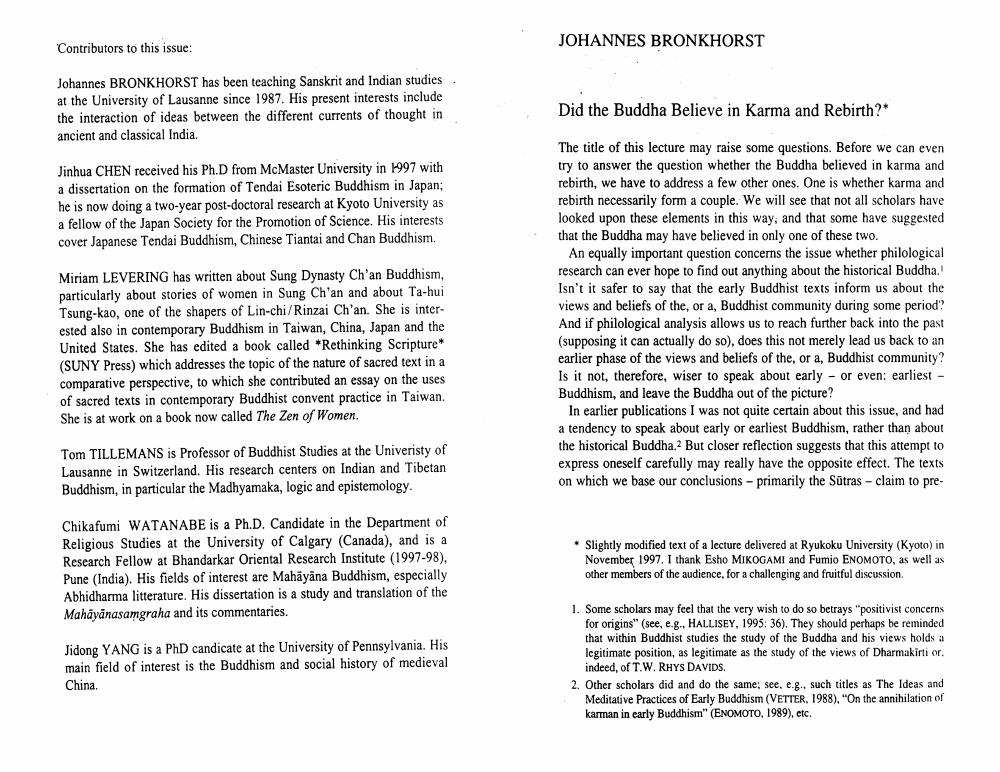Book Title: Did Buddha Believe In Karma And Rebirth Author(s): Johannes Bronkhorst Publisher: Johannes Bronkhorst View full book textPage 1
________________ Contributors to this issue: JOHANNES BRONKHORST Johannes BRONKHORST has been teaching Sanskrit and Indian studies at the University of Lausanne since 1987. His present interests include the interaction of ideas between the different currents of thought in ancient and classical India. Did the Buddha Believe in Karma and Rebirth?* Jinhua CHEN received his Ph.D from McMaster University in 1997 with a dissertation on the formation of Tendai Esoteric Buddhism in Japan; he is now doing a two-year post-doctoral research at Kyoto University as a fellow of the Japan Society for the Promotion of Science. His interests cover Japanese Tendai Buddhism, Chinese Tiantai and Chan Buddhism Miriam LEVERING has written about Sung Dynasty Ch'an Buddhism, particularly about stories of women in Sung Ch'an and about Ta-hui Tsung-kao, one of the shapers of Lin-chi/Rinzai Ch'an. She is interested also in contemporary Buddhism in Taiwan, China, Japan and the United States. She has edited a book called *Rethinking Scripture (SUNY Press) which addresses the topic of the nature of sacred text in a comparative perspective, to which she contributed an essay on the uses of sacred texts in contemporary Buddhist convent practice in Taiwan She is at work on a book now called The Zen of Women. The title of this lecture may raise some questions. Before we can even try to answer the question whether the Buddha believed in karma and rebirth, we have to address a few other ones. One is whether karma and rebirth necessarily form a couple. We will see that not all scholars have looked upon these elements in this way, and that some have suggested that the Buddha may have believed in only one of these two. An equally important question concerns the issue whether philological research can ever hope to find out anything about the historical Buddha. Isn't it safer to say that the early Buddhist texts inform us about the views and beliefs of the, or a, Buddhist community during some period And if philological analysis allows us to reach further back into the past (supposing it can actually do so), does this not merely lead us back to an earlier phase of the views and beliefs of the. or a, Buddhist community? Is it not, therefore, wiser to speak about early - or even: earliest - Buddhism, and leave the Buddha out of the picture? In earlier publications I was not quite certain about this issue, and had a tendency to speak about early or earliest Buddhism, rather than about the historical Buddha. But closer reflection suggests that this attempt to express oneself carefully may really have the opposite effect. The texts on which we base our conclusions - primarily the Sütras - claim to pre Tom TILLEMANS is Professor of Buddhist Studies at the Univeristy of Lausanne in Switzerland. His research centers on Indian and Tibetan Buddhism, in particular the Madhyamaka, logic and epistemology. Chikafumi WATANABE is a Ph.D. Candidate in the Department of Religious Studies at the University of Calgary (Canada), and is a Research Fellow at Bhandarkar Oriental Research Institute (1997-98), Pune (India). His fields of interest are Mahāyāna Buddhism, especially Abhidharma litterature. His dissertation is a study and translation of the Mahāyānasamgraha and its commentaries. • Slightly modified text of a lecture delivered at Ryukoku University (Kyoto) in November 1997. I thank Esho MIKOGAMI and Fumio ENOMOTO, as well as other members of the audience, for a challenging and fruitful discussion Jidong YANG is a PhD candicate at the University of Pennsylvania. His main field of interest is the Buddhism and social history of medieval China. 1. Some scholars may feel that the very wish to do so betrays "positivist concerns for origins" (see, e.g., HALLISEY, 1995:36). They should perhaps be reminded that within Buddhist studies the study of the Buddha and his views holds a legitimate position, as legitimate as the study of the views of Dharmakirti or. indeed, of T.W. RHYS DAVIDS. 2. Other scholars did and do the same; see, e.g.. such titles as The Ideas and Meditative Practices of Early Buddhism (VETTER, 1988), "On the annihilation of karman in early Buddhism" (ENOMOTO, 1989), etc.Page Navigation
1 2 3 4 5 6 7 8 9 10
